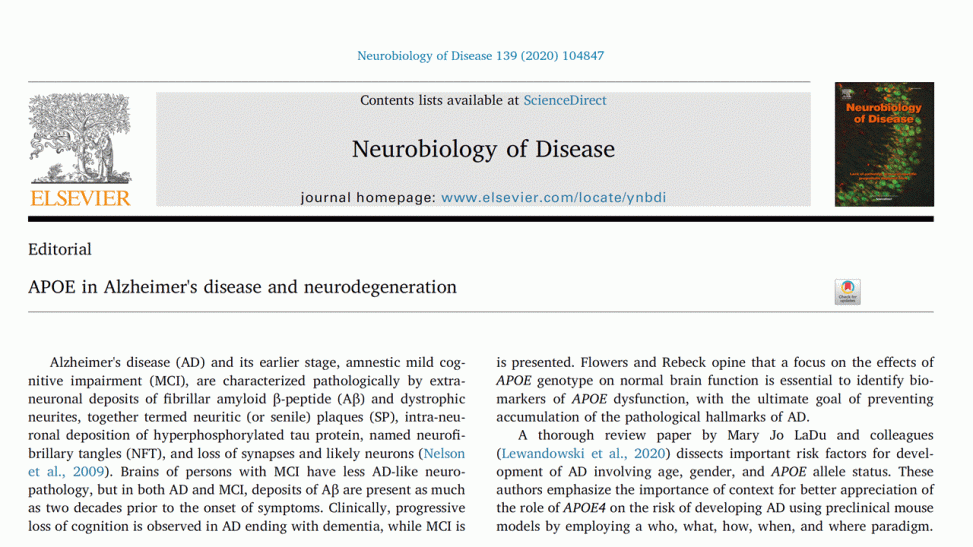New developments in our understanding of ApoE and late onset Alzheimer’s disease
In early 2020 a special issue of the journal Neurobiology of Disease was published containing eleven articles exploring the role of the ApoE risk gene in the development of late onset Alzheimer’s disease. This open access journal issue was edited by Allan Butterfield and Lance Johnson and can be found here:
This was followed by the establishment of a popular online seminar series, Alzheimer’s Afternoons, organized by Lance Johnson and Rik van der Kant. This biweekly seminar series began in March – in the middle of the COVID-19 outbreak, when most researchers had closed their laboratories – and is scheduled to run into June, at least. It includes seminars by over thirty active researchers in the field, broadcast from their homes as they shelter in place, and has attracted well over 200 attendees per seminar. The series also grew to include a separate collection of shorter “happy hour” seminars presented online on Fridays by researchers-in-training. Recordings of these seminars are available online, for a limited time.
Alzheimer’s Afternoons 3:00pm ET Tuesdays and Thursdays
On Twitter @AlzAfternoons
http://www.ljohnsonlab.com/ad-seminar-series.html
This confluence of articles and seminars highlights the increasing amount of research aimed at understanding the role of the apoe4 risk gene in the development of Alzheimer’s disease and related pathologies.
The published studies, useful reviews, and online seminars are all fascinating. However, it’s easy to become overwhelmed by the amount of information – two forty-minute seminars plus two shorter “happy hour” talks from trainees each week, plus the flurry of new publications. To help, I’ve produced the following summaries to help keep them organized in my mind as well as to assist those who are not experts in the field but have a personal interest in apoe4 to follow along.
Disclaimer: these are simply my summaries of selected seminars. Any errors or omissions are mine alone. I encourage readers to access the original, published peer-reviewed research and provide links whenever possible. Nothing herein represents medical advice.
For non-experts in the field
For those starting out and looking for a good review of the apoe4 gene as related to Alzheimer’s disease I recommend this recent review:
A Quarter Century of APOE and Alzheimer’s Disease: Progress to Date and the Path Forward
Michael E. Belloy, Valerio Napolioni, and Michael D. Greicius
Neuron 101, March 6, 2019
https://doi.org/10.1016/j.neuron.2019.01.056
For those who are not scientists in closely related fields – or those who are healthcare providers, policy-makers, advocates, caregivers, apoe4 carriers, or concerned family members – I offer the following recommendations:
- Most articles discussed here are “open access”, meaning free to download and read. A few might be behind a paywall. For those articles behind a paywall you can access a summary and sometimes the figures. Also, you will find that most researchers are willing top provide free PDF copies of their “paywalled” papers if you ask nicely. (Of course, it’s an interesting question why any taxpayer funded research would be locked up behind a paywall in the first place, but that’s a subject for another time.)
- This research is quite difficult. It requires adequate funding and long periods of time to build and maintain a functioning laboratory of graduate students, technicians, and post-doctoral researchers. These individuals train for decades, work very long hours, and endure far more failure than success. The articles you read are triumphs of tenacity and collaboration. The best way to ensure that their progress continues is to support basic science research. This is especially important now, when many researchers can not access their laboratories due to the COVID-19 pandemic.
- Don’t be overwhelmed by the complexity of research articles, thinking that you (or anyone else) should understand them upon a first reading. We’re here to help! I remind undergraduate science students that they are doing well to understand half of what they read the first time through, and 75% upon more careful study. Very few people – maybe the authors, if not too much time has passed – will understand >90% of any published article. It’s ok to rely upon the summaries, abstracts, and good science news coverage of an article
- The process of translating basic research into medical care is a long and arduous one. Clinical trials take many years and millions (sometimes billions) of US dollars and many years to complete. Most potential therapies fail – this is something all too familiar to anyone following Alzheimer’s research. But such trials are necessary to turn basic research into an effective and safe treatment. The research described here represent important first steps on this journey.
- Again, the usual disclaimer applies: Nothing here should be taken as medical advice.
- If you wish to support Alzheimer’s research by volunteering for a clinical trial, here’s one way to do so: https://www.actcinfo.org/.
- If you are searching for a supportive community of people who carry the apoe4 risk gene, try: apoe4.info.
Cheers, TMA
